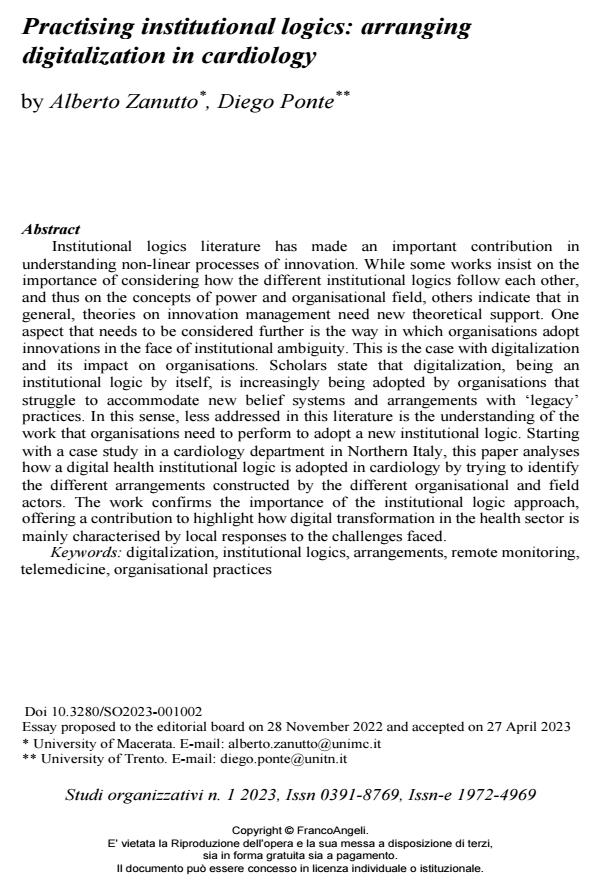Practising institutional logics: arranging digitalization in cardiology
Titolo Rivista STUDI ORGANIZZATIVI
Autori/Curatori Alberto Zanutto, Diego Ponte
Anno di pubblicazione 2023 Fascicolo 2023/1
Lingua Inglese Numero pagine 27 P. 33-59 Dimensione file 259 KB
DOI 10.3280/SO2023-001002
Il DOI è il codice a barre della proprietà intellettuale: per saperne di più
clicca qui
Qui sotto puoi vedere in anteprima la prima pagina di questo articolo.
Se questo articolo ti interessa, lo puoi acquistare (e scaricare in formato pdf) seguendo le facili indicazioni per acquistare il download credit. Acquista Download Credits per scaricare questo Articolo in formato PDF

FrancoAngeli è membro della Publishers International Linking Association, Inc (PILA), associazione indipendente e non profit per facilitare (attraverso i servizi tecnologici implementati da CrossRef.org) l’accesso degli studiosi ai contenuti digitali nelle pubblicazioni professionali e scientifiche.
Institutional logics literature has made an important contribution in understanding non-linear processes of innovation. While some works insist on the importance of considering how the different institutional logics follow each other, and thus on the concepts of power and organisational field, others indicate that in general, theories on innovation management need new theoretical support. One aspect that needs to be considered further is the way in which organisations adopt innovations in the face of institutional ambiguity. This is the case with digitalization and its impact on organisations. Scholars state that digitalization, being an institutional logic by itself, is increasingly being adopted by organisations that struggle to accommodate new belief systems and arrangements with ‘legacy’ practices. In this sense, less addressed in this literature is the understanding of the work that organisations need to perform to adopt a new institutional logic. Starting with a case study in a cardiology department in Northern Italy, this paper analyses how a digital health institutional logic is adopted in cardiology by trying to identify the different arrangements constructed by the different organisational and field actors. The work confirms the importance of the institutional logic approach, offering a contribution to highlight how digital transformation in the health sector is mainly characterised by local responses to the challenges faced.
La letteratura sulle logiche istituzionali ha dato un importante contributo alla comprensione dei processi di innovazione. Mentre però alcuni lavori insistono sull’importanza di guardare al susseguirsi delle diverse logiche istituzionali, e quindi sui concetti di potere e campo organizzativo, altri indicano che, in generale, le teorie sulla gestione dell’innovazione necessitano di un nuovo supporto teorico. Un aspetto che merita maggiore considerazione è il modo in cui le organizzazioni adottano le innovazioni di fronte all’ambiguità istituzionale. È il caso della digitalizzazione e del suo impatto sulle organizzazioni. Gli studiosi affermano che la digitalizzazione, essendo una logica istituzionale a sé stante, viene sempre più adottata da organizzazioni che lottano per accogliere nuove credenze e pratiche di fronte allo status attuale. In questo senso, meno affrontata in letteratura è la comprensione del lavoro che le organizzazioni devono svolgere per adottare una nuova logica istituzionale. Partendo da un caso di studio in un reparto di cardiologia del Nord Italia, questo lavoro analizza come una logica istituzionale di sanità digitale sia adottata in cardiologia cercando di identificare i diversi assetti (arrangements) costruiti dai diversi attori organizzativi e di campo. Il lavoro conferma l’importanza dell’approccio della logica istituzionale, offrendo un contributo per evidenziare come la trasformazione digitale nel settore sanitario sia caratterizzata principalmente da una risposta locale alle sfide affrontate.
Parole chiave:digitalizzazione, logiche istituzionali, arrangements, telemonitoraggio, telemedicina, pratiche organizzative
Alberto Zanutto, Diego Ponte, Practising institutional logics: arranging digitalization in cardiology in "STUDI ORGANIZZATIVI " 1/2023, pp 33-59, DOI: 10.3280/SO2023-001002